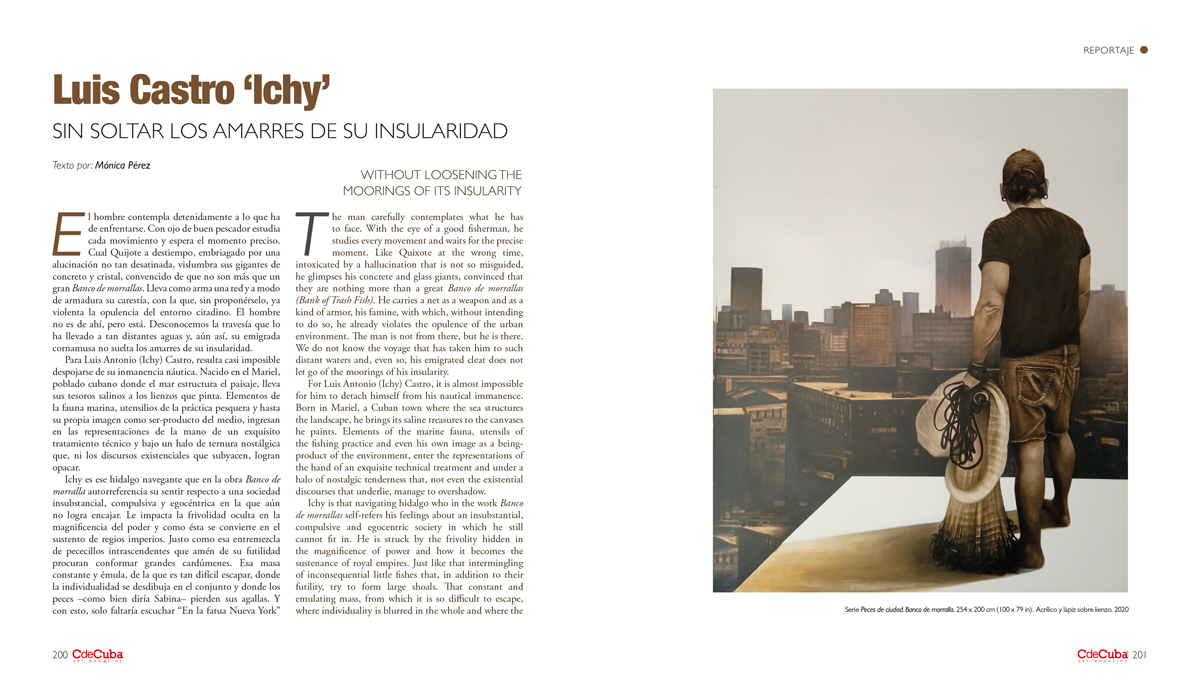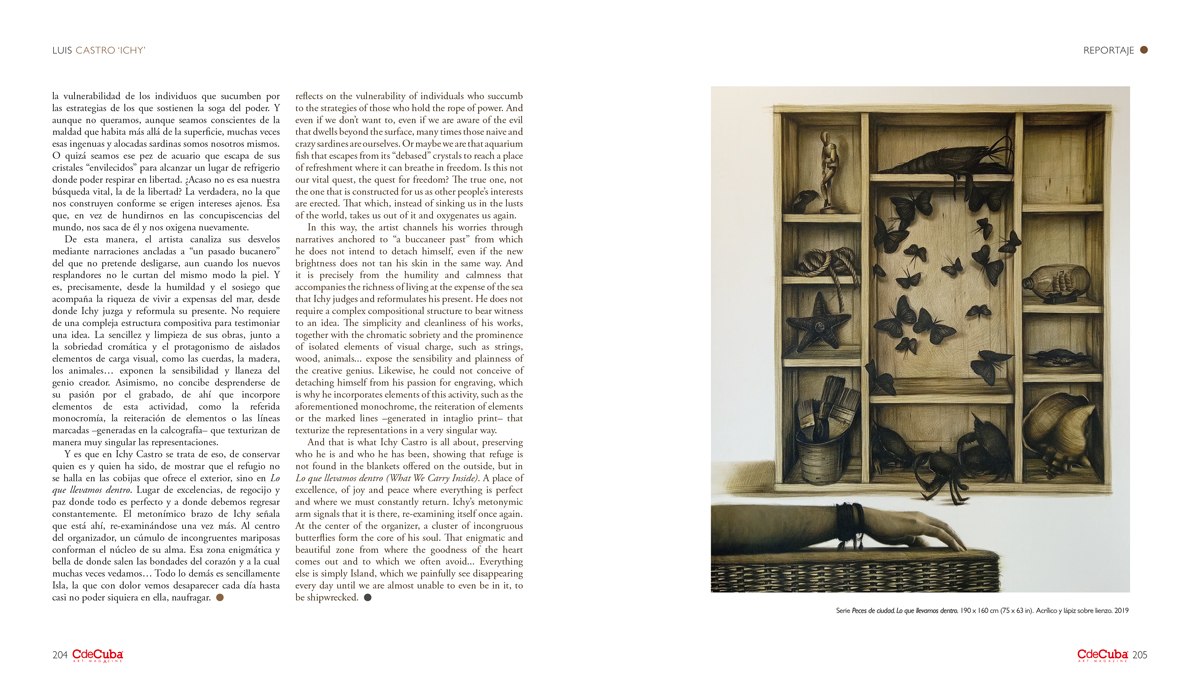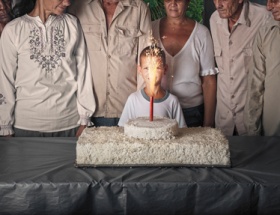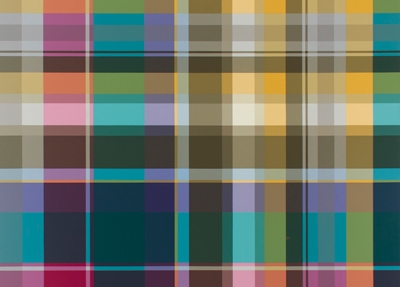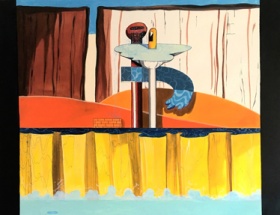Without Loosening the Moorings of Its Insularity
By Alay Fuentes Bejerano
The man carefully contemplates what he has to face. With the eye of a good fisherman, he studies every movement and waits for the precise moment. Like Quixote at the wrong time, intoxicated by a hallucination that is not so misguided, he glimpses his concrete and glass giants, convinced that they are nothing more than a great Banco de morrallas (Bank of Trash Fish). He carries a net as a weapon and as a kind of armor, his famine, with which, without intending to do so, he already violates the opulence of the urban environment. The man is not from there, but he is there. We do not know the voyage that has taken him to such distant waters and, even so, his emigrated cleat does not let go of the moorings of his insularity.
For Luis Antonio (Ichy) Castro, it is almost impossible for him to detach himself from his nautical immanence. Born in Mariel, a Cuban town where the sea structures the landscape, he brings its saline treasures to the canvases he paints. Elements of the marine fauna, utensils of the fishing practice and even his own image as a being-product of the environment, enter the representations of the hand of an exquisite technical treatment and under a halo of nostalgic tenderness that, not even the existential discourses that underlie, manage to overshadow.
Ichy is that navigating hidalgo who in the work Banco de morrallas self-refers his feelings about an insubstantial, compulsive and egocentric society in which he still cannot fit in. He is struck by the frivolity hidden in the magnificence of power and how it becomes the sustenance of royal empires. Just like that intermingling of inconsequential little fishes that, in addition to their futility, try to form large shoals. That constant and emulating mass, from which it is so difficult to escape, where individuality is blurred in the whole and where the fish –as Sabina would say– lose their gills. And with this, it would only be necessary to listen to “In fatuous New York” to understand the closeness of this work with the song Peces de ciudad (City Fish) by the renowned Spanish singer-songwriter. A wink that even gives its name to the series Ichy has been working on for some time now.
Peces de ciudad explores human conflicts and how they are expressed at the level of the subject and the community. It speaks of migrations and survivals, of adaptations to unknown habitats, of forgetfulness, of the meretriciousness of identities and thoughts, of deceptive seductions…
Lures, those that lead to paths of death and in front of which we must practice La espera (The Wise) and patient waiting that manages to mitigate our instinct, at the same time that enhances our self-control. In a world-system where the agenda of its owners is full of hooks and manipulations, it becomes exhausting the effort not to come out stumbling to the fatal reality of sifted intentions. But whoever waits and searches for the true direction, the true nourishment, manages to identify the deception and rest confident. Ichy reappears on this new occasion seated in front of a hook, which he observes with a serene attitude. It does not represent a threat to him. However, faced with the possibility of becoming a fisherman, he reflects on the vulnerability of individuals who succumb to the strategies of those who hold the rope of power. And even if we don’t want to, even if we are aware of the evil that dwells beyond the surface, many times those naive and crazy sardines are ourselves. Or maybe we are that aquarium fish that escapes from its “debased” crystals to reach a place of refreshment where it can breathe in freedom. Is this not our vital quest, the quest for freedom? The true one, not the one that is constructed for us as other people’s interests are erected. That which, instead of sinking us in the lusts of the world, takes us out of it and oxygenates us again.
In this way, the artist channels his worries through narratives anchored to “a buccaneer past” from which he does not intend to detach himself, even if the new brightness does not tan his skin in the same way. And it is precisely from the humility and calmness that accompanies the richness of living at the expense of the sea that Ichy judges and reformulates his present. He does not require a complex compositional structure to bear witness to an idea. The simplicity and cleanliness of his works, together with the chromatic sobriety and the prominence of isolated elements of visual charge, such as strings, wood, animals… expose the sensibility and plainness of the creative genius. Likewise, he could not conceive of detaching himself from his passion for engraving, which is why he incorporates elements of this activity, such as the aforementioned monochrome, the reiteration of elements or the marked lines –generated in intaglio print– that texturize the representations in a very singular way.
And that is what Ichy Castro is all about, preserving who he is and who he has been, showing that refuge is not found in the blankets offered on the outside, but in Lo que llevamos dentro (What We Carry Inside). A place of excellence, of joy and peace where everything is perfect and where we must constantly return. Ichy’s metonymic arm signals that it is there, re-examining itself once again. At the center of the organizer, a cluster of incongruous butterflies form the core of his soul. That enigmatic and beautiful zone from where the goodness of the heart comes out and to which we often avoid… Everything else is simply Island, which we painfully see disappearing every day until we are almost unable to even be in it, to be shipwrecked.
